| December 25, 2016
In the history of Federation Internationale di Motocyclisme-sanctioned World Championship motorcycle racing, no matter the discipline, only one American-born competitor has ever been able to amass four world titles. That man’s name is Eddie Lawson, and he now has a partner in accolades. On Saturday night, October 22, 2016 inside Etihad Stadium in Melbourne, Australia, Greg Hancock, at the almost astonishing age of 46, earned the fourth FIM Speedway World Championship of his storied career.
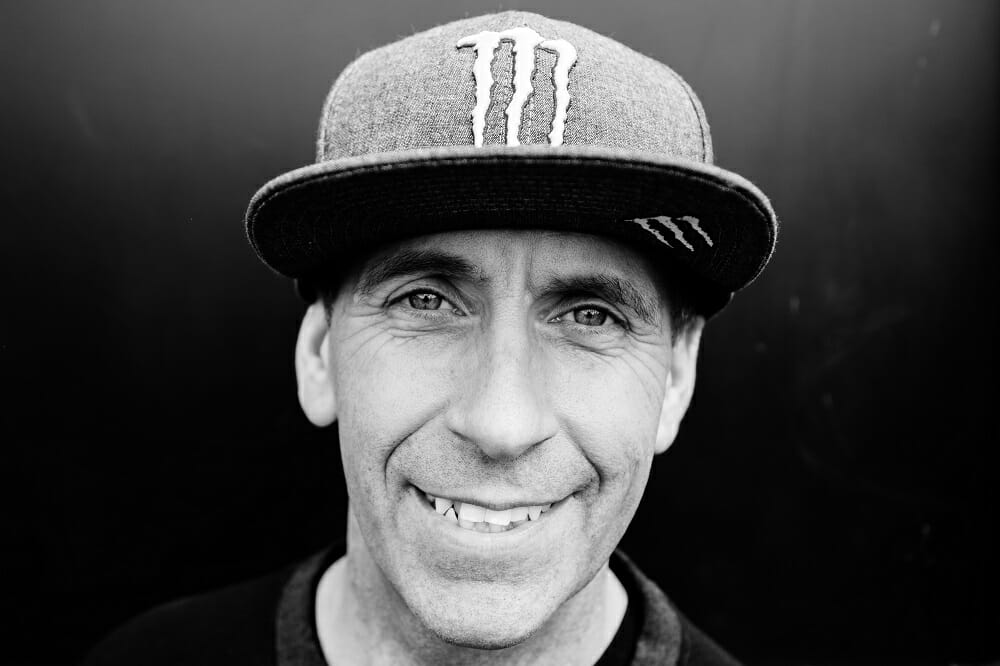 Just when you think he can’t possibly do it again, 46-year-old Greg Hancock reels off another FIM Speedway World Championship.
Just when you think he can’t possibly do it again, 46-year-old Greg Hancock reels off another FIM Speedway World Championship.
In fact, since the inception of the Speedway World Championship at London, England’s Wembley Stadium in 1936, Hancock is now one of only six speedway riders to earn four or more world titles. In an era where motorcycle racers from the United States are conspicuously absent from the global stage of international competition, the globetrotting Californian, virtually singlehandedly, has been hoisting up the American flag and taking it places it has never gone before. Still over in Sweden—the home base for his relentless European-based racing schedule—Hancock chatted with us about his remarkable fourth championship-winning season.
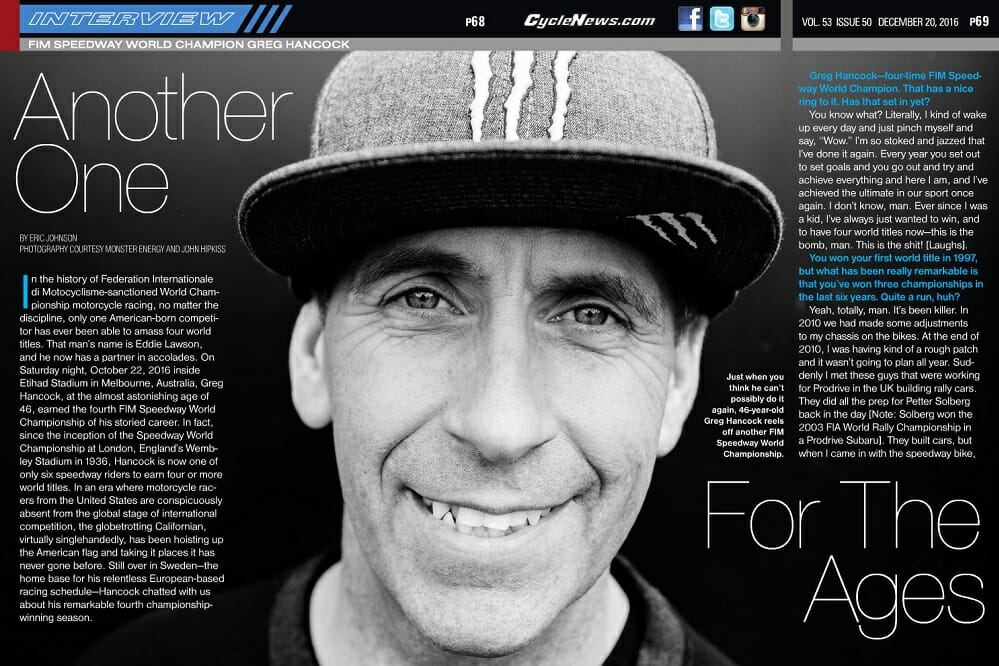
To read this in Cycle News Digital Edition Magazine, click HERE
By Eric Johnson
Photography Courtesy Monster Energy and John Hipkiss
Greg Hancock—four-time FIM Speedway World Champion. Has a nice ring to it. Has that set in yet?
You know what? Literally, I kind of wake up every day and just pinch myself and say, “Wow.” I’m so stoked and jazzed that I’ve done it again. Every year you set out to set goals and you go out and try and achieve everything and here I am, and I’ve achieved the ultimate in our sport once again. I don’t know, man. Ever since I was a kid, I’ve always just wanted to win, and to have four world titles now—this is the bomb, man. This is the shit! [Laughter].
You won your first world title in 1997, but what has been really remarkable is that you’ve won three championships in the last six years. Quite a run, huh?
Yeah, totally, man. It’s been killer. In 2010 we had made some adjustments to my chassis on the bikes. At the end of 2010, I was having kind of a rough patch and it wasn’t going to plan all year. Suddenly I met these guys that were working for Prodrive in the UK building rally cars. They did all the prep for Petter Solberg back in the day [Note: Solberg won the 2003 FIA World Rally Championship in a Prodrive Subaru]. They built cars, but when I came in with the speedway bike, they all jumped at the chance to work with it. They built a couple of different chassis combinations that suddenly opened my eyes and made the racing even more fun because I was able to correct some of the old bad habits and started riding the bike like I was a teenager again.
The following year, I had an amazing season and I won my second world title after 14 years. From all the small changes each year, I come away from every race going, “That was good, but I can still be better. What can I do to be better?” I’m attacking it like a young kid with a massive career ahead of him. I haven’t grown up.
 When it comes to racing, Hancock is pure business.
When it comes to racing, Hancock is pure business.
For the most part, speedway bikes have remained unchanged throughout modern history. Correct me if I’m wrong, but the sport is so much about the rider, isn’t it?
You know what? It really is. The rider and the bike have to work together. The bikes haven’t evolved that much. They still look kind of prehistoric. The Prodrive guys kind of opened my eyes to some different materials and a different way of engineering with the frame and the chassis in general. There are also a lot of the engine combinations that are going on now. These types of engines we’re using, they’re quite high performance. They all really look the same on the outside; it’s what’s going on in the inside, and it fools a lot of people. In one way it’s really cool, because the engines are still manually carbureted and there is no traction control. You still have to ride the bike, and it come down to that the rider is very, very important on the thing as well.
As 46 years old, you’re a much older rider than most of your competition. Is speedway is a sport where being older and having all the knowledge and experience that you have actually pay off?
Without a doubt. I think with anything in life in general, you obviously mature and you learn a lot as you go. But it’s cool. The sport, I’ve been around it since I was about five years old, and here I am at 46 and I’m still loving it, and I’m still learning so much all the time. I can’t beat my competition on pure aggression, you know? These guys have got way more aggression and way more attitude and are willing to throw the thing wherever it has got to go, and the only way for me to beat them is to be a little bit smarter and put a little bit more into my equipment to be smoother and faster, rather than just turn the throttle and then hang off the thing.
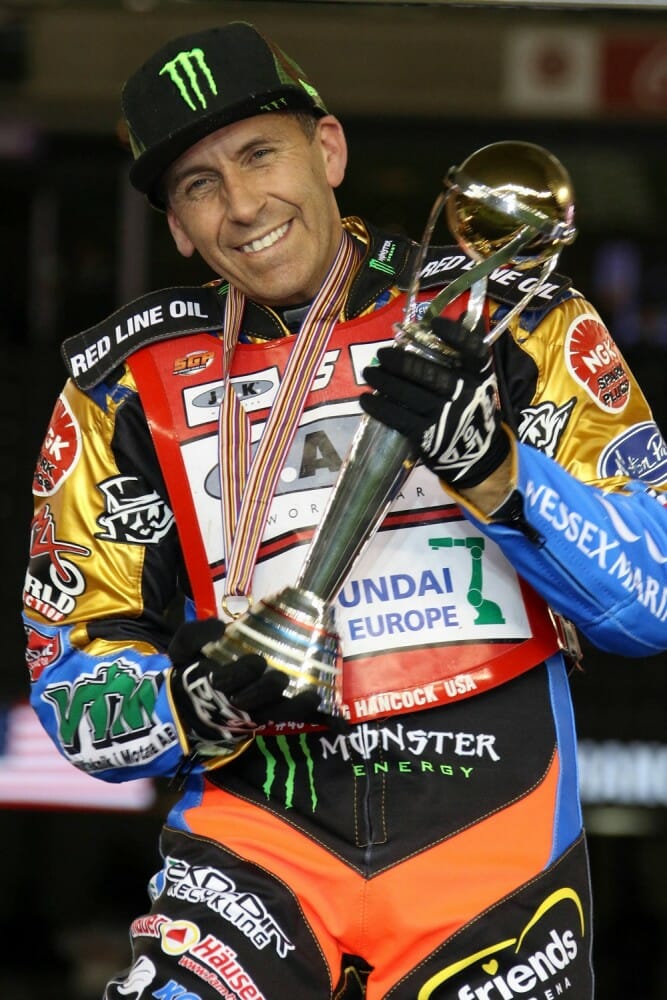 The four-time Speedway World Champion has no plans on retiring anytime soon.
The four-time Speedway World Champion has no plans on retiring anytime soon.
Maybe applying a bit more finesses to the whole thing, eh?
You know what? I’m old school in that way too, man. I grew with the style that you can’t be aggressive on the bike; you’ve got to be smooth and make all of your moves calculated and you have to do everything to get the maximum contact patch of the tire on the ground. The way a lot of the youngsters ride the bike today, they’re hanging off of it, and they’ve got the thing on the back wheel and then they’re locked up. You take a kid like Darcy Ward who you probably know well, he was probably the best of this whole crew because he could damn well have his head hanging on the ground, but he had the bike upright so he had maximum traction with the tire, getting the maximum contact patch to the ground. He mastered that and that’s what made him so dangerous as a competitor, because he mastered something nobody else could do and still be going forward.
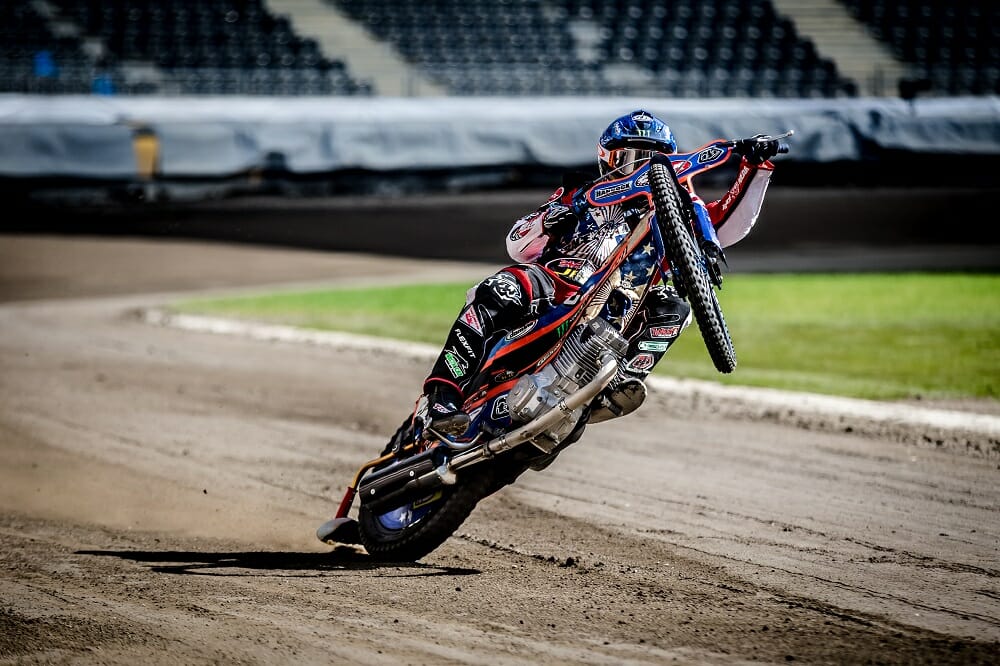 Still got it after all these years.
Still got it after all these years.
Sort of how the MotoGP guys now try to get their bikes straightened up and going forward as quickly as possible?
For sure, man. The thing with speedway, too, is it’s all about wheel spin. The wheels have to be spinning to make the thing get sideways, but we’re trying to calculate it all with the throttle and the contact patch of the tire. You don’t want it to spin too much and you’re trying to find the traction. If the bike is leaned over too far, the tire basically gets weighted. The more upright you are, the more tire you have on the ground—like MotoGP, I guess. The more you can get it upright, the more the bike is going to go forward.
Where is the next way of talented speedway racers coming from? Australia? Certain parts of Europe? The sport has been somewhat dormant in the United States. Will anyone come out of here in the near or not too distant future?
Just what you said, Australia is kind of the birthplace of speedway from the beginning. They’ve had some ups and downs, but there is a flood of youngsters coming through right now from Australia. They’re from age 17 right on up to the current guy who had a good run this year and that’s Jason Doyle. He’s 31.
The biggest flood of riders is coming out of Poland. They have an incredible program from starting the kids at a young age and you can just see the natural progression. As many guys that are graduating up from the senior parts of the team, there’re 10 guys to that one who are coming up from the bottom who are just trying to get into those top spots. They have a heck of a system going strong there.
Even in the U.S. we have a lot of great riders coming up from junior speedway right up until they’re 18 years old. Some are ready to come to Europe, but, man, the biggest issue is that a lot of them are a little bit scared or maybe they’re a little bit hesitant to make the jump across the water and leave home and leave the lifestyle and food and the culture and you’re family and friends. We’ve had a lot of success out of the U.S. over the years starting with Jack Milne in 1937 [Note: Milne was the second-ever winner of the Speedway World Championship], and then Bruce Penhall [1981 and 1982 World Champion], and Sam Ermolenko [1993 Champion] and Billy Hamill [1996 Champion] and myself. It’s been a good run, man.
How old were you when you first went over to Europe to begin racing there?
I was 18.
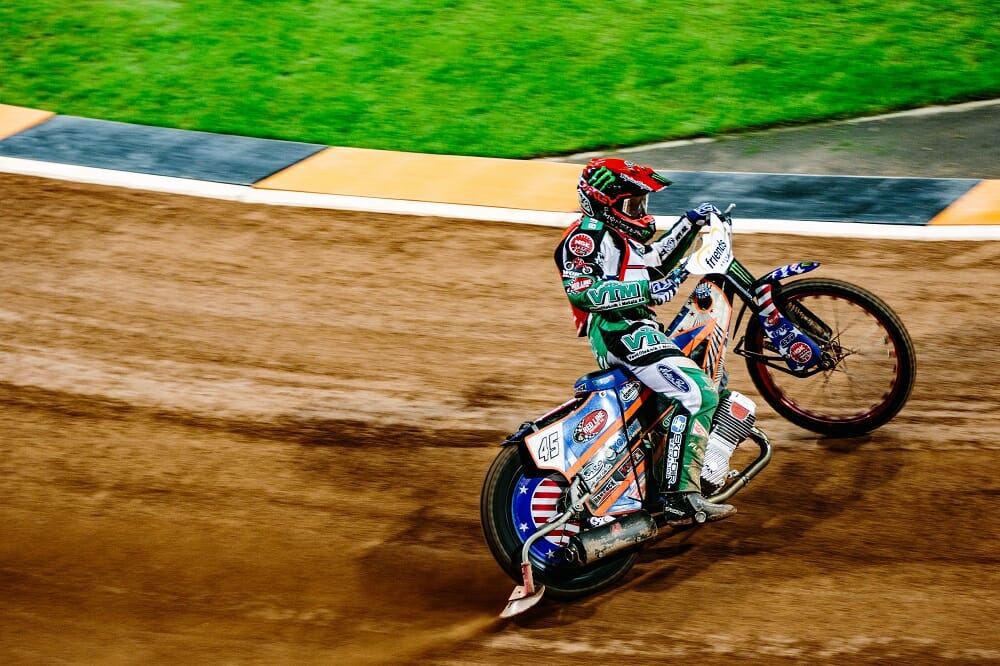 Hancock left home at 18 and he’s still going strong.
Hancock left home at 18 and he’s still going strong.
If a racer wants to make a run at the FIM Speedway World Champion, he has to look to, and eventually station himself in Europe, doesn’t he?
You know what? For sure. You have got to be prepared to sort of give up a lot of things, and I think it’s like that with any kind of thing in life. If you want to do something like this, you can’t be afraid. For me, I didn’t care. I just wanted to go. The first opportunity I got, I was like, “I’m out of here!” My dad gave me a thousand bucks and said, “That’s all I can do for you, son. Good luck. I’m sure you’ll be good.” He helped me all the way, and then once you get over here [Europe] and when you suddenly have to put food on the table, you realize, “I know it was going to be hard work, but I didn’t think it was going to be this hard!” Again, it’s hard work, but if you‘ve got it in you and you want to be the best, California isn’t going anywhere.
I don’t mean to be rude here, but to provide fans with a sort of context of where the sport is at for a professional racer, what kind of living can a top rider such as yourself make racing speedway?
Again, this is where the desire comes in. People think it’s all just fun and games. We work hard for our money. It’s probably anywhere from a couple hundred thousand dollars to half a million bucks or something a year with all of your racing. It is what it is, you know? People may not realize that you have to race probably 50 to a hundred matches a year depending on which league you’re riding in. I do about 70 matches a year myself, so it’s a lot of races for the reward.
To illustrate a year in the life of Greg Hancock, how does one pencil out a schedule of 70 races?
The main part of the financial reward comes from the Polish league and the Swedish league. Those two leagues are massive. I’ll be doing approximately 20 matches a year in Poland and 20 matches a year in Sweden, and then I’ll do 11 matches for the World Championship. The other races that will come in for me around it are the World Team Championship races, as well as some individual matches early in the season, and at midseason that are more for testing than they are for anything.
 Probably no one has sprayed more champagne from a speedway grand prix podium than Hancock.
Probably no one has sprayed more champagne from a speedway grand prix podium than Hancock.
All these far-flung nations and all these different races and what it must take to pull all this off, it sounds like some sort of modern day Jack London adventure story.
That’s probably one of the best parts about my career. This sport has taken me to many places around the globe and I can’t imagine the day that I actually stop doing this. I don’t know if I ever will. I’m based out of Sweden during the racing season. I have full workshop there with bikes and I have my main workshop, which is actually in Poland where we keep most of our grand prix equipment and the Polish league bikes, as well.
All I have to do basically for myself is that I have to get from myself from point A to point B and my mechanics take care of everything else. They get the bikes here and there, and I basically meet them at a track somewhere. Typically, it can be Sunday at a race in Poland, and then Monday I travel back to Sweden. Tuesday we race in Sweden and then Wednesday will usually be a day off to regroup and get everything cleaned up. Thursday I’ll be preparing everything to leave again on Friday for Grand Prix practice. We’ll race the on Saturday and I’m back in Poland on Sunday for another league match. And then it will start all over again on Monday when I’m back in Sweden. We’re going all around Europe, we’re going all around Sweden and we’re going all around Poland and then we finish in Australia for the World Championship.
How long are going to do this for? How long do you want to be a World Champion?
Good question. I don’t know, man. I go year to year. Every day I wake up and I believe I can win. I’m true to myself and I keep going because I love doing what I do and I want to be the best. Until I wake up and feel differently, I don’t envision giving it up any time soon.
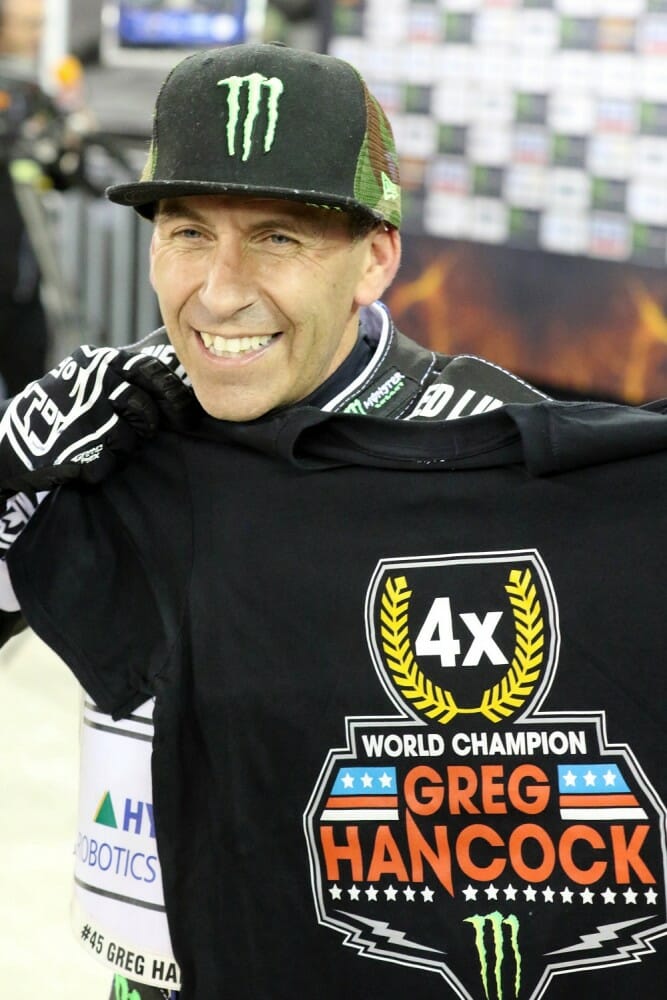 Can he make 5X?
Can he make 5X?
Last question: How cool would it be to have an FIM Speedway World Championship Grand Prix at, say at the StubHub Center in Los Angeles or Petco Park in San Diego? I mean, Southern California is one of the spiritual homelands of speedway, isn’t it?
Man, I’ve been waiting for that since I was 18 years old. I’ve never had the chance to race the World Championship in my home country. I’ve been to a number of other places and won grand prix events in many parts of the world, but I’ve never been able to ride in front of the home crowd. I understand it, but I hope that it happens before I say that I’ve had enough. CN